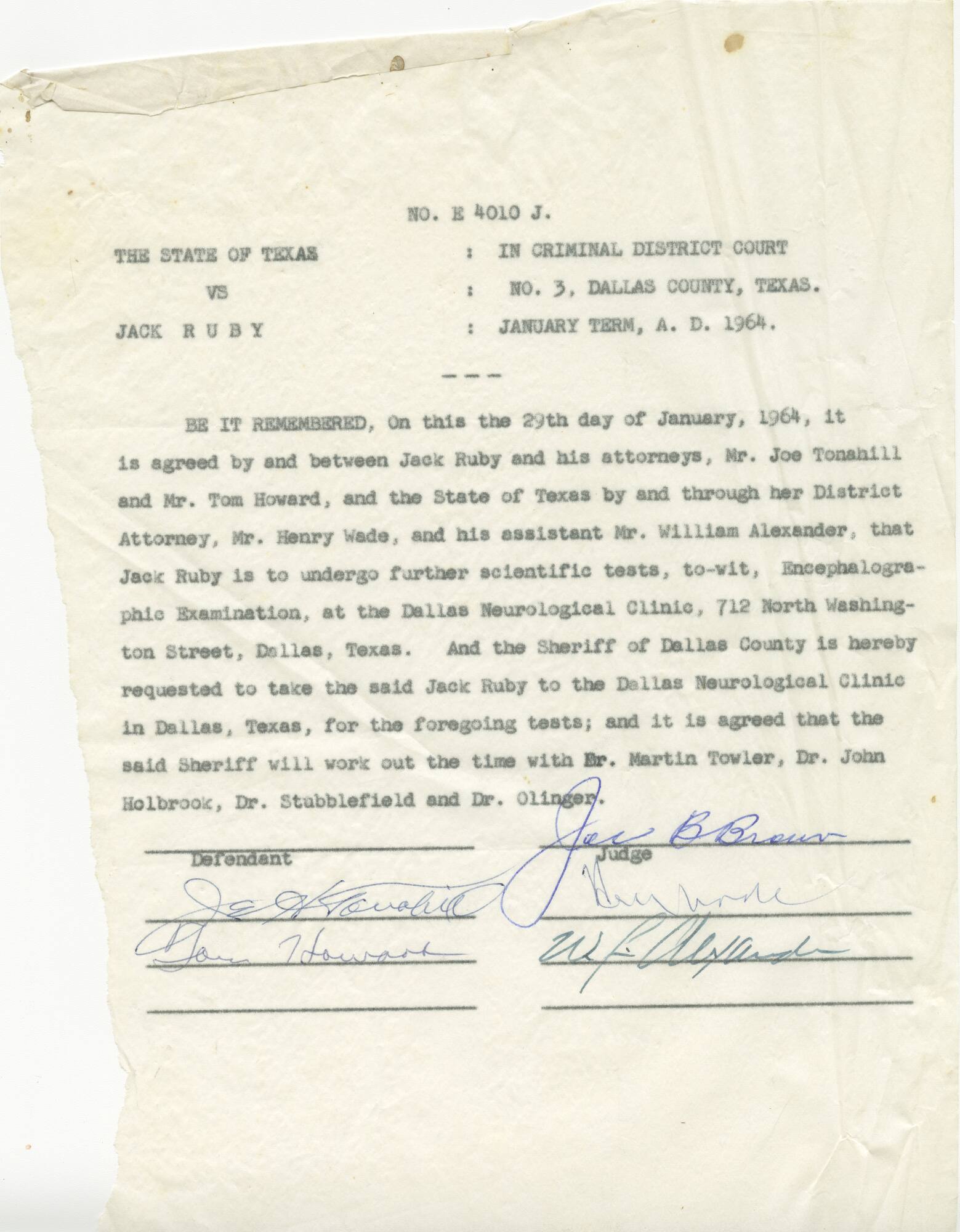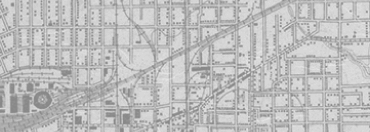


Back
Signed court document arranging EEG for Jack Ruby
Court document from Criminal District Court No. 3 in Dallas, Texas, regarding the agreement for further "scientific tests", specifically an "Encephalographic Examination", that Jack Ruby is to undergo at Dallas Neurological Clinic.The document is signed by Judge Joe B. Brown, District Attorney Henry Wade, assistant District Attorney William Alexander, and Jack Ruby's attorneys - Mr. Joe Tonahill and Mr. Tom Howard. The document was signed on January 29, 1964. The document specifies that the Sheriff of Dallas County is to escort Mr. Ruby to the clinic for the EEG testing. The doctors performing the tests and with whom the Sheriff will coordinate the scheduling of the testing are the following: "Dr. Martin Towler, Dr. John Holbrook, Dr. Stubblefield and Dr. Olinger".This object was originally part of the evidence collected by the Dallas County District Attorney’s Office and specifically prosecutors Henry Wade and Bill Alexander during the investigation leading up to the Jack Ruby trial for the murder of Lee Harvey Oswald.
Signed court document arranging EEG for Jack Ruby
01/29/1964
Jack Ruby trial
DA's Ruby file
Epilepsy
Medical tests
EEG
Ruby, Jack
Wade, Henry M.
Tonahill, Joe H.
Brown, Judge Joe B.
Alexander, William F.
Howard, Tom
Olinger, Sheff D.
Stubblefield, Robert
Towler, Martin
Holbrook, John T.
Dallas County District Attorney's Office
Dallas County Criminal Courts Building
Criminal District Court No. 3
Dallas
Paper
11 × 8 1/2 in. (27.9 × 21.6 cm)
Loaned Courtesy the Dallas County District Attorney's Office/The Sixth Floor Museum at Dealey Plaza
L2017.1.40
This item, along with materials from the DA's Ruby file (which is on loan to the Museum) and from the Museum's permanent collection, briefly appeared in a temporary display on the Museum's seventh floor in 2017. - Lindsey Richardson, Curator of Collections
Attorney Tom Howard, who signed this document, was the first lawyer employed by Jack Ruby's family following the death of Lee Harvey Oswald. He withdrew from the case on February 15, 1964, after clashing with lead defense attorney Melvin Belli of San Francisco, who was hired by the Ruby family in early December 1963. - Stephen Fagin, Curator
In order to ensure its long-term care and preservation and to facilitate public access, the Dallas County District Attorney's Office placed their Jack Ruby Trial Collection (sometimes referred to as "the DA's Jack Ruby file") on long-term loan with The Sixth Floor Museum at Dealey Plaza in 2017. The Museum is working to make the entire collection accessible through this online collections database. To find out more about this collection or to access materials not yet included here, contact the Museum's Reading Room at readingroom@jfk.org. - Megan Bryant, Director of Collections & Interpretation

Signed court document arranging EEG for Jack Ruby
Court document from Criminal District Court No. 3 in Dallas, Texas, regarding the agreement for further "scientific tests", specifically an "Encephalographic Examination", that Jack Ruby is to undergo at Dallas Neurological Clinic.The document is signed by Judge Joe B. Brown, District Attorney Henry Wade, assistant District Attorney William Alexander, and Jack Ruby's attorneys - Mr. Joe Tonahill and Mr. Tom Howard. The document was signed on January 29, 1964. The document specifies that the Sheriff of Dallas County is to escort Mr. Ruby to the clinic for the EEG testing. The doctors performing the tests and with whom the Sheriff will coordinate the scheduling of the testing are the following: "Dr. Martin Towler, Dr. John Holbrook, Dr. Stubblefield and Dr. Olinger".This object was originally part of the evidence collected by the Dallas County District Attorney’s Office and specifically prosecutors Henry Wade and Bill Alexander during the investigation leading up to the Jack Ruby trial for the murder of Lee Harvey Oswald.
Signed court document arranging EEG for Jack Ruby
01/29/1964
Jack Ruby trial
DA's Ruby file
Epilepsy
Medical tests
EEG
Ruby, Jack
Wade, Henry M.
Tonahill, Joe H.
Brown, Judge Joe B.
Alexander, William F.
Howard, Tom
Olinger, Sheff D.
Stubblefield, Robert
Towler, Martin
Holbrook, John T.
Dallas County District Attorney's Office
Dallas County Criminal Courts Building
Criminal District Court No. 3
Dallas
Paper
11 × 8 1/2 in. (27.9 × 21.6 cm)
Loaned Courtesy the Dallas County District Attorney's Office/The Sixth Floor Museum at Dealey Plaza
L2017.1.40
This item, along with materials from the DA's Ruby file (which is on loan to the Museum) and from the Museum's permanent collection, briefly appeared in a temporary display on the Museum's seventh floor in 2017. - Lindsey Richardson, Curator of Collections
Attorney Tom Howard, who signed this document, was the first lawyer employed by Jack Ruby's family following the death of Lee Harvey Oswald. He withdrew from the case on February 15, 1964, after clashing with lead defense attorney Melvin Belli of San Francisco, who was hired by the Ruby family in early December 1963. - Stephen Fagin, Curator
In order to ensure its long-term care and preservation and to facilitate public access, the Dallas County District Attorney's Office placed their Jack Ruby Trial Collection (sometimes referred to as "the DA's Jack Ruby file") on long-term loan with The Sixth Floor Museum at Dealey Plaza in 2017. The Museum is working to make the entire collection accessible through this online collections database. To find out more about this collection or to access materials not yet included here, contact the Museum's Reading Room at readingroom@jfk.org. - Megan Bryant, Director of Collections & Interpretation









